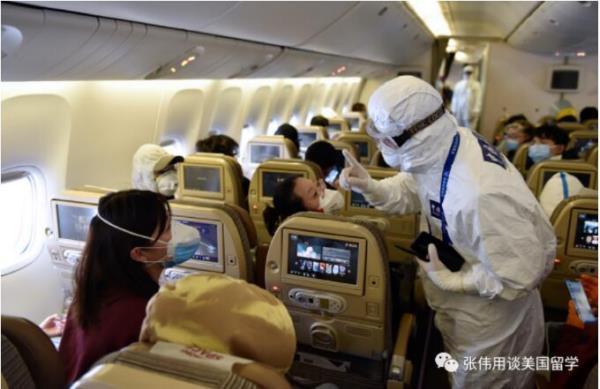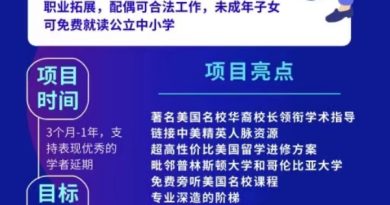人民网英文频道报道 中国留学生回国避难引热议
引言:人民网英文频道约访张伟用老师,从美国大学招生和留学行业影响的角度,谈谈看法。借此机会分享给朋友们。这是英文报道,我问过记者了,没有中文版本,大家将就着看吧。
Chinese overseas students rushing back to China spurs heated discussion online
By Miao Wanyi (People’s Daily Overseas New Media) 10:58, March 25, 2020

(Photo/Xinhua)
As the COVID-19 pandemic worsens outside China, many Chinese who are overseas are rushing back home, especially those young souls who are studying away from home, but whether or not they should go through the long and costly journey at a time when the #coronavirus is spreading around the world has spurred a heated discussion online.
To risk it or not to risk it
Currently, there are no direct from Europe to China, except for a handful of flights run by Chinese airlines. The limited air resources have naturally pushed ticket prices up.
“A face mask now costs more than 50 Swiss Franc, which is six times the amount compared to last December. Every Chinese student I know is desperate to go back home for fear of getting infected under the lax epidemic prevention measures of the overseas governments,” said Tong Dong (Psuedonym), a PhD candidate in Zurich, Switzerland.
On Mar. 20, well over a hundred parents petitioned the Chinese government to arrange charter planes for their children studying in the UK. About 15,000 overseas students between the ages of 10 and 17 are currently in the UK and their parents are worried about their health and safety after schools closed and news of a possible nationwide lockdown in the coming weeks. The Chinese embassy in the UK said preparations are already underway, Caixin reported.
However, in addition to a spike in airline ticket prices, the long flight back home in a confined space and uncertain border control rules at stops at intermediate points raise the risk of being infected. Add in the 14-day quarantine period, and some overseas students say they would rather stay put than leave.
On the other hand, China is at the end of its outbreak, with the continued withering of new confirmed cases, and the country’s hospitals and social systems are recovering from the intense emergency response. Overseas returnees, including overseas students, have become a major source of imported cases recently and that is threatening the hard-won victory that came at the cost of millions of Chinese voluntarily isolating themselves at home for two months.
The Beijing municipal government at a press conference on Mar. 18 recommended that overseas students suspend their trips back to China and recommend that they abide by local prevention regulations, adding that anyone who returns and tries to hide their symptoms will face serious legal consequences.
That warning stems from some recent cases of returnees who intentionally attempted to avoid quarantine at the designated sites, which they thought were inadequate and uncomfortable, asking for things like bottled water, or even jogging outside during the 14-day quarantine period.
Videos of returnees bickering with border workers and refusing to cooperate with quarantine rules have also gone viral on social media, which Chinese netizens criticized as “black horses.”
“I flew over 8,000 km to get back home, but I’m not one of the extreme cases that have circulated online. Overseas students also need understanding and support,” said Yang Jiaxiang, a student at the Academy of Fine Arts in Genoa, Italy.
As for those who chose to stay overseas, watching people gathering and even partying outside is much more worrisome than a national government declaring a state of emergency.
“People were just told to stay at home and wash their hands. People are dying! How is it that this does not matter?” complained Sun Zhao (Pseudonym), a PhD student in Germany. “I hope the Germans will think with reason and logic.”
Meet all changes with constancy
Some overseas students believe that the safest place is at home alone. “The whole world is suffering. No country is spared. Local businesses and residents are doing well so far. The supermarket introduced a ‘senior, disabled and pregnant only’ time. Working from home and studying online are also effective for students like me,” said Qian Chengya, a student in Sydney, Australia.
Overseas Chinese have also demonstrated solidarity in the war against the virus. “Though Italian cities are on lockdown, we can order online and the nearby Chinese markets can send food and necessities to our homes,” said Zhang Yan, a student in Tuscany, Italy.
Chinese embassies around the world are also sparing no efforts helping Chinese citizens to protect themselves in accordance with local guidance and prevention measures.
“The only thing that makes me feel a bit safer is that the Chinese embassy in Switzerland posted comprehensive information about the epidemic on their official WeChat account with the telephone numbers of the embassy and local designated hospitals that receive coronavirus patients,” said Tong.
Shattering aftermath
On the one hand, those studying overseas are fleeing back home; on the other hand, those planning to get their degrees abroad are having more trouble reaching that goal.
Take the United States as an example. According to Zhang Weiyong, the Admissions Representative of Pre-master Program at Southern Methodist University in Dallas, Texas, the suspension of visa applications has slowed applicants down.
To encourage higher enrollment, some American universities have lowered their threshold, which creates an opportunity for top students and some of the schools have boasted good services during the outbreak to ensure safety. Zhang said his university has sufficient medical supplies and has pledged strict disinfection measures as well as medical insurance to all students.
Still, the pandemic that continues to spread across the world has made many applicants and their families concerned. “If this is not reined in by fall semester, many might bail on their study plans,” admitted Zhang, revealing that some former applicants have already decided to study for the Chinese gaokao (college entrance exam) instead.
“The pandemic will leave a scar on the overseas study market and I’m afraid we are only at the initial stage right now. No one knows how big the impact will be in the long run,” said Zhang.

张伟用老师在美国做研究学者,研究课题是中国留学生在美国的学业与职业发展。通过《美国西部新闻》开设“美国留学”专栏,向世界各地中文读者介绍美国大学情况。欢迎读者朋友们和我交流互动,我很乐意和大家交流美国留学相关疑难问题,帮助大家顺利实现理想的留学计划,也丰富我的研究素材。





